Marijuana vs. Alcohol - Health Effects on the Body
Marijuana vs. Alcohol - Health Effects on the Body
Cannabis and alcohol have both had a place in society for centuries. It's no secret that alcohol was once routinely prescribed for medicinal use, and you probably know that the medicinal marijuana market is expanding rapidly.
However, doctors now discourage patients from drinking alcohol. Many even warn about the long-term effects alcohol consumption can have on the body.
You also hear warnings about how cannabis kills brain cells, and while on the surface, this seems alarming, it shouldn't be as worrisome as the effects of alcohol on the body.
Like all things, cannabis can be potentially harmful, especially if it's misused or used to excess.
Many people believe marijuana is less safe because it is illegal, and there was lots of hyperbole around how it was a gateway drug or would corrupt people's morals. But there is some compelling evidence that shows legal drinking in many ways can be much worse for your body.
Is alcohol better than cannabis, or vice versa? This debate has been going on for decades, so let's tackle it here and see if we can get to the truth.
In general, cannabis has fewer risks than alcohol, but there are many factors to consider.
We have aggregated the basic impacts and risks associated with each substance to see how they measure against each other.

Credit for photo: https://geaseeds.com/blog/en/h...
Short-term effects
The short-term effects of marijuana and alcohol vary from person to person.
The feeling of being high or drunk is similar for some people, while others describe the sensations of each very differently. Of course, how you feel when you're intoxicated also depends on how much of the substance you consume and how you take it.
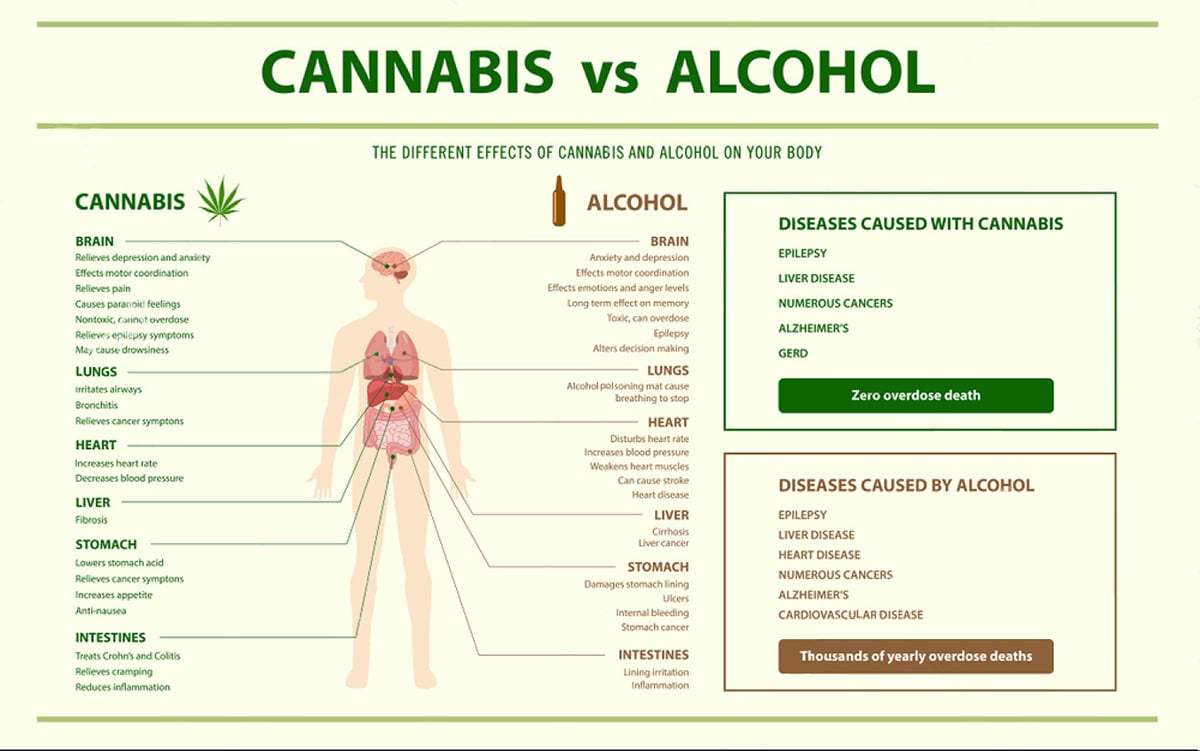
Credit for photo: https://www.shutterstock.com/i...
Short-term effects of alcohol
The feeling of being drunk is different for everyone. While one person may feel relaxed when drunk, another may feel uneasy.
Short-term impacts include:
- Coordination and reaction times
- Impaired cognitive ability
- Impaired judgment
- Relaxation
- Fatigue
- Restlessness
- Shorter attention span
- Nausea and vomiting
Of course, there's often a hangover the next day. This can mean you experience other effects, including headaches and diarrhea.
Short-term effects of cannabis
The immediate effect of weeds varies from person to person.
Some of the most frequently reported impacts include:
- A change in the perception of time
- Coordination and reaction times
- Impaired cognitive ability
- Impaired judgment
- Relaxation (although this can make some people anxious, too)
- Fatigue
- Nausea
- Pain relief
- Dry mouth
- Dry, red eyes
- Hunger increased
Keep in mind that these effects do not include those associated with different consumption patterns, such as smoking or smoking.
Like with a hangover from alcohol, marijuana can have a few lingering effects on some people, including:
- headache
- Fatigue
- Brain fog
Conclusion
Being intoxicated with marijuana is different from being intoxicated with alcohol, but both have roughly the same effect on your cognitive abilities, reflexes, and judgment.
If taken to excess, both are likely to make you feel a little worse the next day, although alcohol is more likely to cause these lingering "hangover" effects.
Long-term health risks
As with the short-term effects of alcohol and marijuana, the long-term effects vary from person to person.
Long-term effects of alcohol
When consumed in large quantities or over a long period of time, alcohol can have a variety of long-term effects, including:
- Liver disease. Excessive drinking can lead to chronic liver disease, which may affect the body's ability to process substances and detoxify.
- Pancreatitis. Alcohol abuse is a major cause of pancreatitis ( a disease of the pancreas).
- Heart damage. Heavy drinking can damage the cardiovascular system.
- Stomach and digestive problems. Heavy drinking can irritate the stomach, causing ulcers, pain, bloating, and irritation.
- Central nervous system damage. This can cause numbness and tingle in the extremities.
- Erectile dysfunction. Long-term alcohol use can lead to erectile dysfunction.
- Infertility. Long-term or heavy drinking may affect fertility in both men and women.
Long-term effects of cannabis
The long-term effects of marijuana are less clear. Then there is the question of consumption methods.
So far, the general long-term effects associated with weeds include:
- Brain development. A study in 2014 suggested that taking marijuana during adolescence can lead to brain development problems later in life. However, the study could not determine whether the problems were permanent.
- Schizophrenia. The link between marijuana and schizophrenia is complex and not yet fully understood. But some experts believe that the use of marijuana can trigger the onset of schizophrenia in some people, especially those with a family history of it.
Again, these effects do not include those related to consumption methods.
It is also important to remember that there is not much long-term research on the effects of marijuana consumption.
Conclusion
Consuming weed seems to have fewer long-term ill effects; however, there is a large disparity in the number of high-quality studies for weed use compared to alcohol.
Marijuana and Alcohol: Effects on the Brain
Both marijuana and alcohol have effects on the brain. They can disrupt thought patterns, memory, motor function, and other physical and mental functions.
Alcohol can take effect after you drink it, although it can be used for cooking. It should be noted, however, that most alcohol evaporates when heated. This means that alcoholic foods usually don't make you drunk.
Cannabis can affect the brain when consumed, whether through smoking, vaping, eating, or drinking cannabis-infused products.
However, the THC must be "activated" by heating (a method known as decarboxylation), otherwise, it won't have any psychoactive effects. This means that if you eat parts of the dried cannabis plant, it will not make you high. Most studies have shown that more cannabinoids are absorbed from the cannabis plant when it is smoked or vaporized.
The effects of alcohol on the brain
According to the America Addiction Center, alcohol affects neuroreceptor sites for GABA, glutamate, and dopamine. Alcohol's effects on GABA centers and glutamate receptors produce physical effects associated with alcohol consumption. These are short-term effects, such as slowing down speech or movement, that can lead to feelings of "drunkenness."
When alcohol affects dopamine receptors, more dopamine is produced. This leads to pleasurable feelings, which is why people often feel happy when they are drunk or in the early stages of intoxication.
However, alcohol has a two-phase effect. This means there are two stages of alcohol use. As mentioned above, the first stage is usually to encourage the good feeling of drinking.
The second stage is due to the overloading of GABA and glutamate centers. After drinking too much alcohol, it may be difficult to control motor functions, such as walking or talking. As many of us know, 'drinking too much' often also causes nausea and vomiting, as the brain overloads and the body tries to get rid of the alcohol.
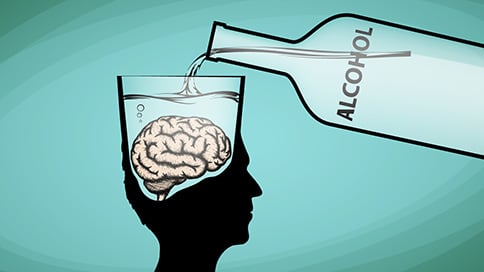
Credit for photo: https://www.nm.org/healthbeat/...
Short-term effects of alcohol on the brain
These include:
- Impaired judgment decision making
- Memory loss
- Blackouts
- Lowers inhibition's
Long-term effects of alcohol on the brain
These may include a variety of adverse effects, such as,
- Reduced gray matter in the brain,
- Reduced visuospatial understanding,
- Decreased cognitive function
- Memory loss
- Shortened attention span
- Wernick-Kosakoff syndrome.
The effects of cannabis on the brain
Cannabis also affects receptors in the brain but most commonly interacts with CB receptors. These receptors have taken up cannabinoids or substances in the body that are most similar to plant cannabinoids in the cannabis plant (such as CBD and THC).
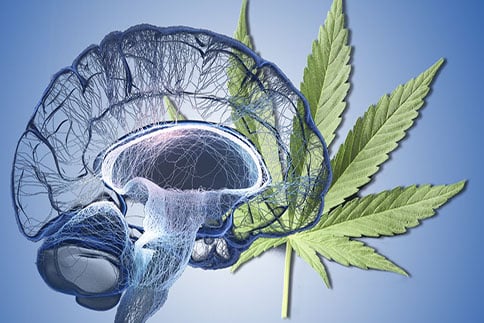
Cannabis activates all of these CB receptors but causes a "flood" in the part of the brain that holds most of the body's receptors. This chemical flood causes the "high" feeling associated with cannabis.
The "high" sensation causes some short-term reactions. According to the US National Institute on Drug Abuse, these reactions may include
- An altered sense of time
- Changes in mood
- Impaired physical movement
- Impaired memory
- Difficulty with cognitive thinking.
Some effects are more severe, but the NIH reports that they are only possible at very high doses. These effects may include the following:
- Psychosis
- Delusions or hallucinations.
But long-term reactions to cannabis are rare. Long-term cannabis use has been most controversial over the possibility of memory loss and decreased brain function. This is where the phrase "cannabis kills brain cells" comes from.
Despite this often-used phrase, there is no hard evidence that using cannabis actually kills brain cells. One study looking at cannabis use and IQ levels did show that people who began smoking in the teens and continued smoking it heavily over the next 25 years on average lost 8 IQ points over 25 years.
This effect was not duplicated when looking at people who started smoking cannabis in their 20's. However, this study is not conclusive as there could be several other factors involved.
Cannabis and alcohol: effects on the liver
Many people are aware of the risks of liver failure and alcohol-related complications, but what about cannabis? Many sources talk about the effects of cannabis foods on the liver and other organs, but is eating cannabis-infused foods bad for the liver?
Some sources disagree on the effect of each substance on liver function, but it's true that almost anything you ingest will affect your liver in some way. Unfortunately, some substances are especially harsh.
The effect of alcohol on the liver
One byproduct of excessive alcohol consumption is acetaldehyde. You may recognize the prefix aceta- from acetaminophen or Tylenol. Like Tylenol,acetaldehyde can cause liver damage, which can lead to a number of serious conditions. This damage is usually irreversible, and conditions may include liver cancer, cirrhosis, and fatty liver.
The weakening of the liver can lead to another condition called alcoholic hepatitis. Most of these diseases are serious, causing pain, bloating, nausea, discomfort, abnormal liver function, hormonal imbalances, and can even be fatal.
Liver damage was the leading cause of alcohol-related death. According to the CDC, in 2015 alone, more than 21,000 people died from alcohol-related liver disease.
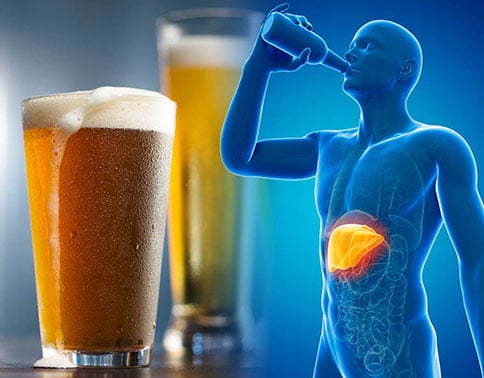
Credit for photo: https://www.express.co.uk/pict...
The effects of cannabis on the liver
Cannabis has no known toxins that can affect the liver. Most studies on cannabis toxicity do not claim it causes liver damage, and there are no known deaths from cannabis-related liver conditions.
But many researchers have studied the effects of cannabis on the liver and have found it to be therapeutic in treating liver disease. A study looking at cannabis as a treatment for the alcoholic-induced liver disease has found that cannabis can reduce the severity and prevalence of progressive stages.
Other studies have suggested that cannabis may be an effective treatment for chemotherapy or other treatments for liver damage and cirrhosis. Marijuana may be able to help reduce nausea associated with these treatments, increase appetite, and combat fatigue.
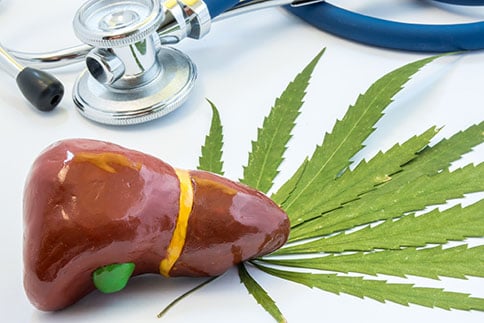
Credit for photo: ttps://cannalogue.ca/column/c...
Cannabis and alcohol: effects on the cardiovascular system
Both marijuana and alcohol can have positive and negative effects on your cardiovascular system. Both are usually beneficial when used in moderation, but overuse can lead to potential health risks. Here's how they each stack up.
The effects of alcohol on the cardiovascular system
Alcohol has a somewhat confusing effect on the heart. Some sources label certain types of alcohol, such as red wine, as "heart-healthy."
This comes after it was found that a glass of red wine a day can help boost good cholesterol and prevent blood clotting. Studies have shown that this is due to resveratrol, an antioxidant that fights free radicals in the blood. Resveratrol can also be found in the skins of red grapes, so a glass of grape juice could achieve the same outcome.

Credit for photo: https://www.therecoveryvillage...
However, having more than one alcoholic drink can have a negative effect.
Short-term effects of alcohol on the cardiovascular system
These include:
- Increased blood pressure, which is caused by dilation of blood vessels.
- Irregular heart rhythm, which can lead to difficulty breathing.
Long-term effects of alcohol on the cardiovascular system
These include the following:
- An increase in triglycerides in the blood.
- Potential to cause more permanent high blood pressure or other conditions that lead to heart disease and heart failure.
Drinking alcohol can also significantly increase your daily calorie intake. Excessive drinking can lead to diabetes or obesity, which also puts pressure on the heart. Alcohol use, according to The American Heart Association, is linked to a number of other conditions, such as arrhythmias, cardiomyopathy, and sudden cardiac death.
The effects of cannabis on the cardiovascular system
Marijuana has a similar reaction to alcohol in that it raises the resting heart rate, dilates blood vessels, and increases blood pressure. Some studies have suggested that the risk of a heart attack is greater within an hour of using marijuana, but many identify it as a risk only for heart disease patients.
However, these are only short-term effects, and research to identify long-term adverse effects is limited.
Many sources do agree, however, that smoking may be risky for some heart patients, who seem more likely to suffer sudden chest pains when under stress.
A study has determined the long-term effects of cannabis use. The study showed that repeated exposure resulted in a lower heart rate, increased blood volume, and decreased circulatory response to exercise. For the most part, these responses are positive unless there is a pre-existing condition otherwise.
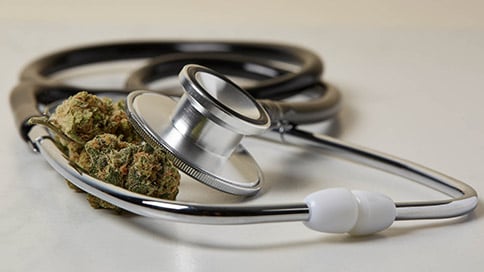
Credit for photo: https://weedmaps.com/learn/can...
Cannabis and alcohol: effects on the respiratory system
Probably the most common fear associated with smoking cannabis is the possibility of lung damage. While some studies have suggested that cannabis may cause certain lung diseases, others have rejected those claims. Since many of the studies involved marijuana users who combined marijuana and tobacco, there could be problems with the study.
In addition, alcohol's effects on the lungs are often overshadowed by its effects on the liver, but some studies do show a harmful link.
The effects of alcohol on the lungs
Lung damage isn't the first thing that comes to mind when thinking about the alcohol side effect. But there's some pretty compelling evidence linking the two. People with AUD are at higher risk for pneumonia, tuberculosis (TB), respiratory syncytial virus (RSV) infection, and acute respiratory distress syndrome (ARDS).
Overall, heavy drinking may weaken the overall immune system, which could mean that the increased risk is general and not lung-specific.
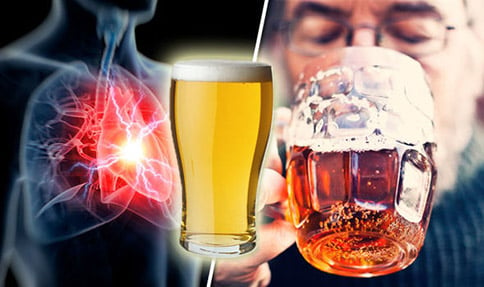
Credit for photo: https://www.express.co.uk/life...
The effects of cannabis on the lungs
While some studies have attempted to link cannabis to lung cancer and other respiratory diseases, other studies have rejected this. Some studies have actually shown a positive effect of cannabis on the lungs.
According to a study, adults who smoke marijuana may have stronger lungs than those who don't. Even after seven years of daily combined training, most participants showed no signs of lung degeneration.
One study even suggests that cannabis can improve lung health by increasing its forced lung capacity or the amount of air that can immediately expel from the lungs. This affects the overall strength and health of the lungs, and many researchers believe this may be due to cannabis's anti-inflammatory effects.
%7DBR.jpg?1616750174979)
Credit for photo: https://www.labroots.com/trend...
Risk of Overdosing. The excessive use of marijuana and alcohol
Although the term "overdose" is often associated with death, this is not always the case. An overdose is defined as an overdose of any drug. Sometimes an overdose can lead to death, but the severity may be reduced. However, overdose can always have adverse side effects. These effects are usually in the range of nausea and vomiting but can be more severe.
Both cannabis and alcohol can produce excessive symptoms. Tolerance varies from person to person based on previous exposure, weight, diet, body chemistry, and other factors.
Alcohol poisoning
Alcohol is a particularly easy substance to overdose with. Excessive drinking is often referred to as "alcoholism ."Alcoholism can be fatal but usually results in hospitalization or serious illness.
Symptoms of alcoholism include:
- Confusion or stupor.
- In a coma
- Vomiting and nausea
- Dyspnea
- Seizures
- Hypothermia
Cannabis overdose
Using too much cannabis can cause "overdose" effects, such as vomiting or nausea. Most studies have found no risk of extreme toxicity with marijuana use. Overdosing on marijuana can be unpleasant because the body may do all it can to expel excess substances.
Usually, the symptoms of an excess of THC or CBD are similar and not severe. Symptoms may include:
- Vomiting and nausea
- Fatigue
- Hallucinations
Is marijuana safer than alcohol?
One cannot be said to be "safer" than the other, because the real health potential lies in the way each substance is used. But many studies seem to agree that alcohol poses serious risks in all areas, especially when consumed in large quantities. Any long-term effects of alcohol on the body can pose serious health risks.
Smoking weed may not be for everyone. But marijuana use appears to have more potential health benefits than adverse effects. If you use marijuana or alcohol recreationally, make sure you understand the risks involved and use the substance responsibly. If you think medical marijuana is right for you, talk to your doctor about adding it to your daily health care routine.
